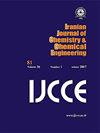Modeling and thermodynamic analysis of Municipal Solid Waste Dryer: A parametric study
IF 1
4区 工程技术
Q4 CHEMISTRY, MULTIDISCIPLINARY
Iranian Journal of Chemistry & Chemical Engineering-international English Edition
Pub Date : 2021-10-17
DOI:10.30492/IJCCE.2021.523967.4555
引用次数: 2
Abstract
Due to the landfill leachate and the lack of drainage beds for collecting and directing leachate, especially in developing countries, the need to study municipal solid waste (MSW) dryers is of particular importance. According to the technical literature, so far no comprehensive study has been performed on MSW dryers considering with the actual components of the waste and the moisture content above 40%. Here a comprehensive study for wet MSW dryers consists of three different parts is performed. In the first part, a semi-theoretical mathematical model is developed to calculate the drying rate (internal) of wet MSW. For this purpose, with the laboratory results in the technical literature and Statistica software, a suitable mathematical model for drying MSW is validated and determined. Then, the external drying rate is determined according to the type of dryer selected and after its validation; it is compared with the internal drying rate. In the second and third parts, after validation of EES developed code, energy and exergy analysis are reviewed and finally parametric study is performed to investigate the effects of different parameters on energy and exergy efficiencies of unsorted wet MSW drying process. The results show that the best model for drying the unsorted MSW is the logarithmic model with a corresponding R^2 of 0.999. The internal and external evaporation rates are 0.157 and 0.165 kg/s and it is seen these two rates are well matched together and differ by only 5%. The energy efficiency and exergy efficiency of the dryer are 13.92% and 2.91%, respectively. According to the parametric study, the inlet air temperature and the temperature of inlet MSW have the greatest effect on energy efficiency, respectively. Inlet air conditions such as absolute humidity of inlet air and atmosphere pressure have the greatest effect on the exergy efficiency of MSW drying.城市生活垃圾干燥机的建模与热力学分析:参数化研究
由于垃圾填埋场的渗滤液和缺乏排水床收集和引导渗滤液,特别是在发展中国家,需要研究城市固体废物(MSW)干燥机是特别重要的。根据技术文献,考虑到垃圾的实际成分和含水率在40%以上,目前还没有对城市生活垃圾干燥机进行全面的研究。本文对湿式生活垃圾干燥机进行了全面的研究,包括三个不同的部分。在第一部分中,建立了一个半理论的数学模型来计算湿生活垃圾的干燥速率(内部)。为此,根据技术文献和Statistica软件中的实验室结果,验证并确定了适合的MSW干燥数学模型。然后,根据所选择的干燥机类型,经过验证,确定外干燥速率;将其与内部干燥速率进行比较。在第二部分和第三部分,对EES开发的规范进行验证后,回顾了能量和火用分析,最后进行了参数研究,探讨了不同参数对未分选湿式生活垃圾干燥过程能量和火用效率的影响。结果表明,未分选生活垃圾的最佳干燥模型为对数模型,对应的R^2为0.999。内部和外部蒸发速率分别为0.157和0.165 kg/s,可以看出这两个速率很好地匹配在一起,仅相差5%。烘干机的能效和火用效率分别为13.92%和2.91%。参数化研究表明,进口空气温度和进口生活垃圾温度对能效的影响最大。进口空气的绝对湿度和大气压力等进口空气条件对生活垃圾干燥的火用效率影响最大。
本文章由计算机程序翻译,如有差异,请以英文原文为准。
求助全文
约1分钟内获得全文
求助全文
来源期刊

Iranian Journal of Chemistry & Chemical Engineering-international English Edition
CHEMISTRY, MULTIDISCIPLINARY-ENGINEERING, CHEMICAL
CiteScore
2.80
自引率
22.20%
发文量
0
审稿时长
6-12 weeks
期刊介绍:
The aim of the Iranian Journal of Chemistry and Chemical Engineering is to foster the growth of educational, scientific and Industrial Research activities among chemists and chemical engineers and to provide a medium for mutual communication and relations between Iranian academia and the industry on the one hand, and the world the scientific community on the other.
 求助内容:
求助内容: 应助结果提醒方式:
应助结果提醒方式:


